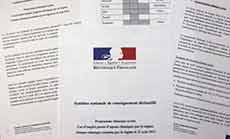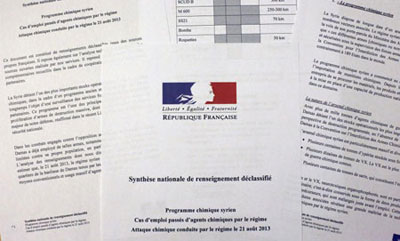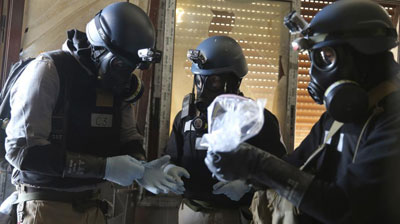Syria: No ’Smoking Gun’ in Declassified Report, Former Intelligence Chief Asserts

Georges Malbrunot - Le Figaro
To General Abel Pertinax, a former Chief of an intelligence service speaking under a pseudonym, the assessment French government has declassified following the chemical attack on Damascus suburb was not groundbreaking. According to the expert, it was a document upon request.
 As the French intelligence authorities declassified an assessment on the presumed chemical weapons' use by the Syrian government against its own population, an appalling document that would obfuscate the regime of Bashar Assad pended; especially that France was the sole nation to venture into such a step on those dramatic events. That was a laudable initiative that would have reinforced the "legitimacy" of the "right to interference" in Syria.
As the French intelligence authorities declassified an assessment on the presumed chemical weapons' use by the Syrian government against its own population, an appalling document that would obfuscate the regime of Bashar Assad pended; especially that France was the sole nation to venture into such a step on those dramatic events. That was a laudable initiative that would have reinforced the "legitimacy" of the "right to interference" in Syria.
The document is clearly a willingly "neutralized" production, devoted to open publishing, thus softened and stripped from any element that might betray or at least lead to unearth the sources. Therefore, a sense of legitimate yet inevitable frustration lied.
A good deal of information on the nature of the Syrian chemical program and the evaluation of chemicals stockpiles are already available before the specialized open sources. Likewise, there exist websites dedicated to chemicals' "fabrication" and "stockpiling," such as the website of CESIM (Centre d'Etudes de Sécurité Internationale et de Maîtrise des Armements), center of analysis and research covering essentially questions of control of armaments, non-proliferation and disarmament.
Assistance by Mossad
Furthermore, the document confirms that the [intelligence] services of many states contribute to this observation and even exchange related info. It is so not mindboggling that 'Israeli" services, in particular, have provided accurate indications on the attacks' operational modes. Germans, much present in Syria since the end of the 1980's with quite an active residence in Damascus, are also key actors in human intelligence. The relation between services from both sides of the Rhine has been exemplary since many years ago.
 It is also plausible that information provided by UN inspectors on the ground have already reached some western services secretly. For the rest of the services, their capacities, namely those of the US (images, phone tapping, human) have allowed to detect these elements.
It is also plausible that information provided by UN inspectors on the ground have already reached some western services secretly. For the rest of the services, their capacities, namely those of the US (images, phone tapping, human) have allowed to detect these elements.
On the August 21 attack, it is futile to fumble for a "smoking gun," that is to say the irrefutable proof of an order given by the supreme Syrian authority and of the use by the army of chemicals against the population in Damascus suburbs.
Analysis, also backed by information provided by ally services, is here confined to accessible sources. There is then no clear-cut evidence on the regime's direct imputation. This is not enough to convince those who are still tentative and the opponents of an active French engagement in a forced operation.
If other states owe this "smoking gun," they [certainly] keep it for themselves and will keep doing so for the moment. This is the barrier coming in between the intelligence services of the high politics.
At last, a document "upon request," drafted as per the demand of the political power to shore up the French participation in a concerted action alongside other linchpins and to alleviate national debate, will be satisfactory. There isn't any revelation whatsoever nor a masterly demonstration of what really happened in Ghouta, on August 21, where hundreds of people died.
Comments




